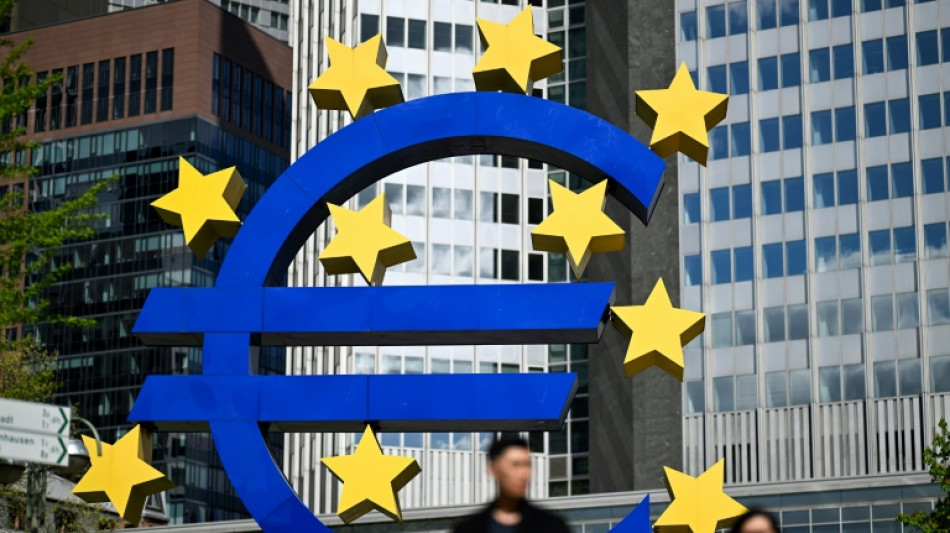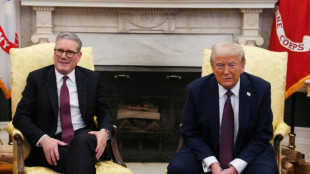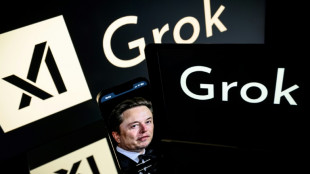
-
 Chapman blasts ton as New Zealand win first Pakistan ODI by 73 runs
Chapman blasts ton as New Zealand win first Pakistan ODI by 73 runs
-
French chefs quake as Michelin prepares new guide

-
 Mike Leigh on the 'hard truths' of film, happiness and World War III
Mike Leigh on the 'hard truths' of film, happiness and World War III
-
Myanmar quake toll passes 1,000 as rescuers dig for survivors

-
 Lights out: Bali guards protect island's day of silence
Lights out: Bali guards protect island's day of silence
-
Myanmar-Thailand quake toll passes 700 as rescuers dig for survivors

-
 UK gallery to return Nazi-looted painting to heirs of Jewish collector
UK gallery to return Nazi-looted painting to heirs of Jewish collector
-
UK dreams of US trade deal before Trump tariffs

-
 'Blink of an eye': survivor tells of Bangkok skyscraper collapse horror
'Blink of an eye': survivor tells of Bangkok skyscraper collapse horror
-
The hand of GOAT, Mensik wins with Messi touch

-
 Partial solar eclipse to cross swathe of Northern Hemisphere
Partial solar eclipse to cross swathe of Northern Hemisphere
-
Tunisian startup turns olive waste into clean energy

-
 Guinea ex-dictator sentenced for 2009 massacre pardoned: junta
Guinea ex-dictator sentenced for 2009 massacre pardoned: junta
-
Chapman ton lifts New Zealand to 344-9 in first Pakistan ODI

-
 Myanmar quake: what we know
Myanmar quake: what we know
-
Vu fires 64 to seize lead at LPGA Ford Championship

-
 Resurgent Liu wins women's figure skating world title
Resurgent Liu wins women's figure skating world title
-
Djokovic to face Mensik with 100th title within reach

-
 Rescuers dig for survivors after huge quake hits Myanmar, Thailand
Rescuers dig for survivors after huge quake hits Myanmar, Thailand
-
South Korea firefighters deploy helicopters as wildfires reignite

-
 'Defiant' Canada autoworkers vow to fight tariff layoffs
'Defiant' Canada autoworkers vow to fight tariff layoffs
-
Performance, museums, history: Trump's cultural power grab

-
 Russian-born 12-ranked Kasatkina says to play for Australia tennis
Russian-born 12-ranked Kasatkina says to play for Australia tennis
-
Wallabies back Jorgensen suffers serious ankle injury

-
 Academy apologizes after stars say it 'failed to defend' Palestinian filmmaker
Academy apologizes after stars say it 'failed to defend' Palestinian filmmaker
-
UN rights chief demands end to 'horrific suffering' in Ukraine

-
 Djokovic oozing confidence ahead of century bid
Djokovic oozing confidence ahead of century bid
-
US regulators to investigate Disney diversity efforts

-
 Elon Musk says xAI startup buying X platform
Elon Musk says xAI startup buying X platform
-
'Jail or death': migrants expelled by Trump fear for their fate

-
 Djokovic closing in on 100th title after Dimitrov downed in Miami
Djokovic closing in on 100th title after Dimitrov downed in Miami
-
Leverkusen beat Bochum to stay hot on Bayern's heels

-
 Global markets slide as fears over US tariffs intensify
Global markets slide as fears over US tariffs intensify
-
Dorival Junior sacked as Brazil coach after Argentina humiliation

-
 Djokovic cruises past Dimitrov into Miami Open final
Djokovic cruises past Dimitrov into Miami Open final
-
No.1 Scheffler ties Houston Open record with 62 to grab lead

-
 Trump auto tariffs strike at heart of North American trade
Trump auto tariffs strike at heart of North American trade
-
Vance says Denmark has 'under invested' in Greenland

-
 Green light for Winter Olympics bobsleigh slope
Green light for Winter Olympics bobsleigh slope
-
Musk's DOGE team emerges from the shadows

-
 Film stars blast Academy for 'failing to defend' Palestinian filmmaker
Film stars blast Academy for 'failing to defend' Palestinian filmmaker
-
Record fine for UK university renews free speech row

-
 Grizzlies fire head coach Jenkins: team
Grizzlies fire head coach Jenkins: team
-
'Game-changing' Hazlewood shines as Bengaluru thrash Chennai in IPL

-
 Table-topping Bengaluru thrash Chennai by 50 runs in IPL
Table-topping Bengaluru thrash Chennai by 50 runs in IPL
-
Israel warns of attacks 'everywhere' in Lebanon after rocket fire

-
 Utah becomes first US state to ban fluoride in drinking water
Utah becomes first US state to ban fluoride in drinking water
-
Trump prompts US allies to reopen nuclear weapons debate

-
 Nigerian police ban Kano Eid parade as rival emirs dispute throne
Nigerian police ban Kano Eid parade as rival emirs dispute throne
-
Ex-Barcelona star Dani Alves has rape conviction overturned


ECB's digital euro sparks flurry of online misinformation
European Central Bank president Christine Lagarde's recent remarks on a "digital euro" prompted a fresh wave of misinformation online, highlighting an uphill battle ahead to convince the public of the project's merits.
The decision to create a digital euro -- essentially an electronic form of cash backed by the ECB -- has not been made yet and any possible launch would be years away.
But when Lagarde in a press conference this month referenced an October 2025 deadline for moving to the next stage of preparations, social media lit up with alarmed messages that the launch was imminent.
Harald Vilimsky, a member of the European Parliament from Austria's far-right Freedom Party (FPOe), was among those posting that the ECB "wants to introduce the digital euro in October", an incorrect claim that spread in several languages.
The claim was echoed on X by Nicolas Dupont-Aignan, the eurosceptic head of the Rise Up France party, who added that the project was "madness for our freedoms".
Other widely shared posts repeated misconceptions that have long dogged the project: that a digital euro would mean the "end of cash" or be used for financial surveillance, allowing the ECB to "block" or "track" payments or "access savings".
"Your money will no longer be yours," alleged a French TikTok video shared more than 15,000 times.
The falsehoods circulating online reveal a broader "mistrust of centralised institutions", said Vicky Van Eyck, executive director of campaign group Positive Money Europe.
Recent comments by French President Emmanuel Macron and European Commission chief Ursula von der Leyen about investment needs were similarly misused in viral posts that falsely claimed people's savings would be taken from them.
- 'Strategic autonomy' -
The ECB and dozens of other central banks worldwide are exploring or putting in place central bank digital currencies (CBDCs) as cash use declines.
Conspiracy theories about governments planning cashless societies as way of controlling citizens have proliferated since the Covid-19 pandemic, but ECB officials have been at pains to stress that a digital euro would complement cash -- not replace it.
Issued by the ECB, the money would be risk-free. It would be held in a digital wallet and payments could be made online or offline, allowing for cash-like anonymity. The ECB says it would not be able to directly link transactions to specific individuals.
In making the case for a digital euro, the ECB argues that it would bolster Europe's "strategic autonomy".
A digital euro would allow for direct money transfers between users, offering a pan-European payment service that could reduce reliance on US payment giants such as Mastercard, Visa, Apple Pay or PayPal.
"This dependence exposes Europe to risks of economic pressure and coercion," ECB chief economist Philip Lane warned last week, in a nod to transatlantic tensions under US President Donald Trump.
Lane said a digital euro could also counter the influence of increasingly popular dollar-backed "stablecoins" -- private digital currencies that are pegged to the US dollar and could undermine the euro if widely adopted in Europe.
- Challenges -
Some observers remain critical.
Ignazio Angeloni, a former ECB official and currently a fellow at Milan's Bocconi University, said Europeans already had "a plethora" of easy payment options and weren't necessarily looking for another.
For now, the digital euro discussions were still at a fairly technical stage, Angeloni said, and many members of the public were "not interested".
Van Eyck said interest could be hindered by plans to cap how many digital euros consumers could hold.
An ECB report published in March found that between 2022 and 2024, awareness about the digital euro jumped from 18 to 40 percent among eurozone survey respondents. The potential willingness to use it remained below 50 percent.
The decision to issue a digital euro will only come once European Union legislation is in place, but progress in Brussels has been slow.
If adopted, a digital euro would be introduced from mid-2027 or 2028 at the earliest, officials told AFP.
Good communication with the public will be key to its success, said Van Eyck.
"The big issue with not having the public on board is that the digital euro could flop," she said.
Y.Aukaiv--AMWN

